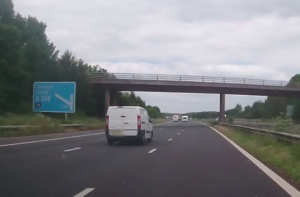Dr Howard Robinson is one of the industry’s well-know asphalt experts. No he is on a mission to help support local authorities save money by helping keep their ‘green’ roads in better condition for longer. He talks to Adrian Tatum about the benefits of asphalt preservation and why it is important to use an original, authentic and trusted source.
Whoever came up with the quote ‘knowledge is power’ probably had little insight at the time into how much of a profound statement that would turn into.
But in most cases, experience is fundamental to the development of a business and for ASI Solutions that is no exception. It has one of the industry’s most experienced professionals at its helm and he has taken the business forward over the last few years as part of its mission to protect roads, airfields, test tracks, bridges and car park surfaces to help keep them in better condition for longer.
“When I first joined ASI a few years ago I was intrigued by the fact that local authorities, who were under increasing pressure because of declining budgets, could preserve and protect roads that were in green or light amber condition to last longer so they could spend the money saved on other roads that needed far more urgent attention,” says the company’s Managing Director, Dr Howard Robinson.
Dr Robinson has been trying to change the way the industry thinks about roads for decades and his knowledge is certainly helping ASI. You won’t find many people as experienced as he is. He has been part of the industry for over 30 years now working for Nynas, Wimpey Minerals, Tarmac and for ten years as Chief Executive of the Road Surface Treatments Association (RSTA).
But he made the move from RSTA to ASI for a reason. “It impressed me that there was an original, authentic and trusted product-Rhinophalt- in the market place that meant local authorities and other organisations had a surface treatment that could make a real difference as part of their asset management toolbox, while reducing their carbon footprint at the same time,” he says.
Stringent manufacturing control of Rhinophalt and good management of ASI’s supply chain has also meant that the product is extremely cost effective. “Rhinophalt can double the asphalt road surface service life for half the cost compared to resurfacing, if two treatments are made in 10 years,” says Dr Robinson.
This is based on treating roads in a green to light amber condition, and in particular Stone Mastic Asphalt (SMA) and Thin Surface Course Systems (TSCS), which ideally should be treated two years before reactive maintenance is needed to help prolong the life.
In recent years, there has been a significant rise in interest in preservation treatments. “In our case Rhinophalt is a proven technology which people trust and that has led to more and more local authorities wanting to use the process to help keep their roads in better condition for longer. As well as this preservation is helping councils to comply with some of the requirements in the new Code of Practice, Well-Managed Highway Infrastructure around life cycle planning, reducing whole life cost and lowering their carbon footprint.”
“There are also rumours that some of the central government funding for highway maintenance will require councils to be more consistently innovative in their approach and Rhinophalt can help with that and ASI can support councils with the bidding process,” adds Dr Robinson. “We have adopted a very consultative approach and honest approach to the way we work with our customers. If Rhinophalt is not suitable for a certain road or application elsewhere, we will say so. Our collective experience as a team means we can help support councils and other customers by providing the best possible advice for the challenges they are facing. That’s why we believe asphalt preservation is a really important part of a local authorities’ armoury in terms of asset management and maintenance programmes and this is backed up by the rise in interest.”
But this rise in interest in preservation technology has also led to other products coming into the market that have different ingredients which are cheaper by design with little or no track record and little evidence of long-tern performance. Rhinophalt contains the original, authentic American Gilsonite.
The US was where it all started for asphalt preservation and it has been a major success over 40 years there now.
Gilsonite is a natural bitumen which is a mineral antioxidant and is a key component in preventing asphalt deterioration caused by oxidation of the bitumen. Gilsonite resin is much harder than bitumen –so as well as being an antioxidant it also reinforces, seals and strengthens the surface course and slows down asphalt ageing.
This means that when Rhinophalt is applied to the asphalt surface course it penetrates through micro-cracks and interconnecting voids to form a hard seal, keeping water out and slowing the ageing process.
But what advice would Dr Robinson give if customers want to compare preservation products? “I think the advice for anyone looking at these products is to ask lots of questions. Check and ask for proof of all the claims. Ask to see the HAPAS or equivalent Product Assessment certificate-which we have, ask about the authenticity of the core ingredients and ask about the technology that sits behind the brand, remembering that preservation won’t be suitable for every road,” he says.
“Having Product Certification such as HAPAS doesn’t necessarily mean it will work under all circumstances. The road authority needs to check the level of traffic under which the product was tested when it received HAPAS certification and also ask where it has been used on previous schemes to ensure it is fit for purpose and the product provider should provide evidence to support their claims around end performance. So, for example a product could be tested on a low trafficked A road and still get HAPAS certification but its performance will not be proven on more heavily trafficked roads,” Dr Robinson adds.
As well as a rise in interest from potential end users, there has also been a number of new contractors willing to work with ASI to use Rhinophalt as well. In the past year or so Asphalt Preservation Services entered the market and more recently, Velocity became the latest company to work with ASI to apply Rhinophalt, working with Henry Williams.
As well as supplying the product, ASI is supporting its partners with technical knowledge, carrying out a site-inspection survey together to determine appropriateness for the treatment and the design.
Velocity join a number of contractors currently working with ASI to apply Rhinophalt including; Asphalt Preservation Services, Allied Infrastructure, RMS, Colas, Roadgrip and Roadtechs.
“Our message to any contractor we are working with or would like to work with us is that asphalt preservation shouldn’t be seen as something that is done instead of surface dressing rather something that can be done alongside it as part of a number of surface treatments. So, it’s very much an opportunity for them to add value to their offering. Treatment of Rhinophalt does not prevent other treatments in the life cycle from being used it just keeps green and light amber roads in good condition for longer.”
“Even for the Tier 1 contractors working on the strategic network or on behalf of local authorities-this is something that could save their clients’ money on reactive repairs, keeping the good roads in better condition for longer meaning there is money to be spent elsewhere on the network as well as helping with maintenance lifecycle planning. In fact, it can be ideal for motorways because of the very limited traffic management and resources needed and it is easily applied at night,” said Dr Robinson. Following a pre-sweep the product is quietly sprayed on to the road with one pass of the machine. No compaction or heavy equipment is required, and because the profile of the road is maintained there is no need to raise ironworks, curb heights or thresholds, he said.
“We work very closely with our delivery partners to ensure their crews are properly trained and to ensure their application vehicles are working accurately to deliver the correct rate of spread. We advise authorities on which roads in their network are suitable for treatment and those that are not and will supervise work on site if required,” he adds.
Rhinophalt received HAPAS certification in March 2007 following a comprehensive two-year trial on the M40-the second heaviest trafficked road in England. Critical for successful preservation the certificate specifically identifies natural bitumen (Gilsonite) as the key component in the process.
“That is one of the reasons why I joined ASI because I was so impressed with the number of prestigious asphalt projects that have been treated with Rhinophalt not only in the UK but around the world-on roads, bridges, test tracks, carparks and airfields,” says Dr Robinson. Rhinophalt has also been used on the A1(M), A6, A421, A50, M11 as well as numerous local authority sites including Blackpool, Leicestershire, Northamptonshire, and Staffordshire as well as the famous Hangzhou Bay Bridge in China, test tracks all over Europe as well as international airports such as Sydney for example. Rhinophalt is also suitable for treating strategic, resilient, urban routes as well as lower trafficked sites including footways.
Despite the slow start to the year, 2020 has seen ASI approved contractors complete re-treatment on the M40 together with some new local authority and regional airport projects. This summer saw the successful re-treatment of one of the UK Ministry of Defence’s most prestigious sites. During this contract the vast majority of the asphalt within the base was preserved with Rhinophalt, totalling over 500,000m2. This project was complete in just under three weeks with the team being able to replicate previous outputs of 50-60,000m2 in a single shift where access allowed. It has also been ASI’s second best year in Germany, where the product has now been widely adopted by road authorities.
“The success for Rhinophalt has come because people trust the product. Everyone will know that you have to earn that trust in this industry and because we are the only company that is 100% dedicated and focused on asphalt preservation, I think that has helped show our commitment to our clients in delivering the best service and that’s why we are proud of our provenance, CE Mark and HAPAS certificate, says Dr Robinson.
“ASI provides a proven tested product and an unrivalled support service that is reliable and consistent. We will work to ensure that every job is successful, and we will always advise expertly and truthfully in an open transparent manner.”
























